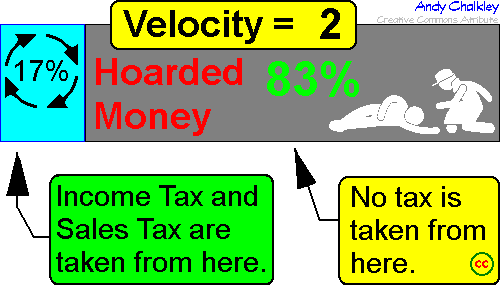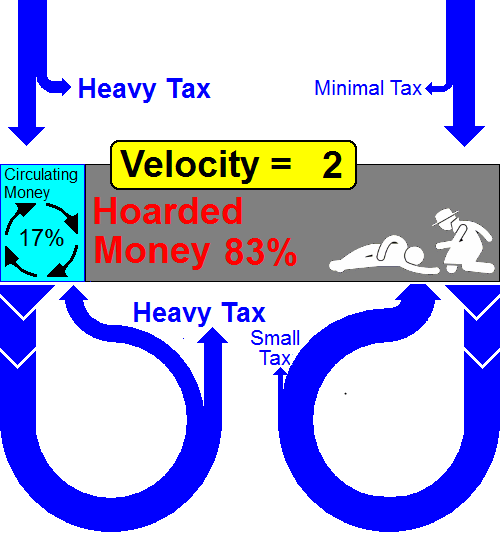
This chapter deals with taxes that encourage hoarding. Most taxes are taken from Circulating Money. Almost no tax is taken from Hoarded Money.

Although almost all tax is taken from Circulating Money, some taxes are lower on income that is likely to become Hoarded Money. Income Tax on unearned income escapes Payroll Tax and tends to be earned by the wealthy and is more likely to become hoarded. Gains on certain asset sales obtain a tax discount and are more likely to become Hoarded Money. Money earned through sweat and toil tends to get spent within a week and rapidly enters the Circulating Money. Hoarded Money tends to be owned by people that have ‘more money than they can spend’, so taxes that favour the better off will encourage hoarding.
Taxes modify the spending habits of businesses and consumers. Inappropriate taxation tends to distort the economic marketplace. Inappropriate taxes will lead to losses in efficiency and sometimes to decreased tax collection. Taxes can be revenue-negative which means that an increase in tax rate can cause business activity to fall and consequently create a decreased revenue to the government.
Another unfortunate effect of some taxes is their cyclical nature. When there is a recession, some taxes cause a significant fall in government tax collection.
My Terrible Taxes are taxes that have bad characteristics. I list a few of these bad characteristics here:
Payroll Tax is a tax paid by employers or employees. It is usually calculated as a percentage of the salaries that employers pay their employees. Payroll taxes can be classified as:
Payroll taxes paid by employers are effectively a government mark-up on the cost of labor. Payroll Tax is payable from the first dollar. It is not progressive. It is charged at the same rate irrespective of the incomes of the employees. But this is not the worst element. This quasi-Income Tax is only payable by people working for companies. Someone that makes their money by other means, does not pay Payroll Tax. ‘Unearned Income’ thus escapes Payroll Tax. Those that are earning vast amounts of interest are more likely to be the hoarders and they avoid the added burden of Payroll Tax on their ‘un-earned income’. Thus, Payroll Tax favours the hoarders of money over those earning money from genuine human effort. Land monopolisers living off rent income also avoid Payroll Tax. As those earning interest income are certainly hoarders of money and landlords are likely to be hoarders, we are giving a direct tax advantage to money destined to become Hoarded Money. Those employees operating in the Circulating Money section of the economy get hit harder than those operating in the Hoarded Money section. Payroll Tax encourages an increase in Hoarded Money and is a downward pressure on velocity.
Warren Buffet: “Well, taxes -- if you make money with money, you get taxed very -- at very low rates; 15 percent dividends in capital gains. No payroll tax. If you make money with muscle or hard work or sweat of your brow, you get taxed at rates that move on up. And most of the people, the middle-class gets taxed at rates of either 15 percent or 25 percent on their income tax, but then they get really hit hard on the payroll tax and that’s what brings the rates in our office up to an average of 36 percent if you leave me out.” [14]
Paul Begala: “Republicans want to punish work and reward wealth; hence the high payroll tax and the low dividend tax.” [5]
Howard Warren Buffett: “I’ve never had it so good in terms of taxes. I am paying the lowest tax rate that I’ve ever paid in my life. Now, that’s crazy. And if you look at the Forbes 400, they are paying a lower rate, accounting payroll taxes, than their secretary or whomever around their office. On average. And so I think that actually, people in my situation should be paying more tax. I think the rest of the country should be paying less.”
Howard Warren Buffett: “I love to tell how I’m suffering because one percent we’re paying 25 percent of the total. We’re not paying 25 percent of the total taxes on individuals. We’re paying maybe 25 percent of the income tax, but the payroll tax is over a third of the receipts of the federal government. And they don’t take that from me on capital gains. They don’t take that from me on dividends. They take from the woman who comes in and takes the wastebaskets out.”
Payroll Tax gives a tax advantage to the hoarders. Payroll Tax is a tax on the transactions between an employer and an employee. Thus, it is a tax on money when money is carrying out its duty of creating transactions. It is also a tax on Circulating Money. This tax is also counter-cyclical for the government. When a recession arrives, tax collection falls.
Payroll Tax also gives a significant advantage to persons with unearned income and thus magnifies the chance that the Hoarded Money percentage will increase. If money is earned in a factory, it is subject to Payroll Tax. Unearned income escapes this Payroll Tax.
Income tax is a tax on the money transactions between and employer and an employee. It is a tax on an important class of transactions within Circulating Money. It is a direct tax on Circulating Money and a constant drain on Circulating Money. It has another issue in that is counter-cyclical. When the economy retracts, the revenue from Income Tax falls.




Income Tax is a tax that should be minimised, certainly for lower income earners. Income Tax should be reduced and partially replaced with Land Tax, Wealth Tax, Transaction Taxes and other less damaging taxes.
Income Taxes are notoriously prone to avoidance and evasion. The income tax regulations effectively turn large portions of the population into criminals. The tax encourages great effort into minimising and avoiding the tax. Significant national effort goes into reducing this tax making this an inefficient tax.
Small Business pays Income Tax at the same rate as individuals. But the calculation is different. For a business, it is calculated as profit rather than income. The worst component of Income Tax for Business is depreciation. Depreciation delays tax deductions for expanding businesses. Besides discouraging business expansion and business start-ups, it pushes expanding businesses toward bank borrowing. Expanding businesses and start-up businesses should receive tax deductions or tax delays rather than increased taxation. Expanding businesses are increasing the available jobs in the nation.
Depreciation is a calculation on purchased assets. When assets are purchased they are not treated as an expense until some time into the future. This leaves businesses short of working capital. Asset purchases are effectively treated as income. Expanding businesses pay a higher rate of income tax than steady state business or shrinking businesses. Small and medium business have a high tax compliance cost compared to an individual.
Depreciation rates should be set higher than the actual physical life of the applicable asset to compensate for the lack of a compensation arrangement for inflation.
Taxing the small business sector may reduce the likelihood of new businesses taking advantage of business opportunities left unexplored by existing businesses. Barriers to market entry tend to reduce competition in product markets, leading to inefficient production. [3]
Most big businesses start out as small businesses. Small business plays a vital role as the seedbed for future big businesses.
This tax is a tax on the result of all transactions by a company during a year. It is thus a tax on the success of transactions. It is a tax on Circulating Money. Company Tax should be of a level that does not inhibit activity. Depreciation turns the Company Tax into a Profit Tax. Money has been expended, but a tax deduction cannot be claimed until well into the future. Expanding companies depreciate their assets in the future. This forces expanding companies to seek money elsewhere. Rather than borrow money from banks, they tend to sell shares. Depreciation forces companies to sell shares to people with ‘more money than they can spend’ who then get part of the earnings of the company without the daily effort and stress involved with running the company.
One employee of a mining company told me that the company existed for the purpose of creating invoices. He had been well brainwashed. Companies have a much wider role than that and these roles are often given inappropriate priority. They provide employment for citizens, goods and services to citizens and lower down the list, they make income for a few owners and provide tax for the government.
Effectively, the profits of corporate activities finish up as income of individuals so corporate tax is a temporary removal of tax until the profit is taxed as individual income tax.
Corporations have become so skilled at minimising tax that any attempt to charge a high corporate tax will only punish the local business and give favour to international business. Corporate tax should be minimised and depreciation should be immediately deductible. There are so many loopholes and methods for companies to move profit to low tax jurisdictions that high tax rates become ineffective. High tax rates encourage avoidance
This tax is a direct tax on transactions that involve goods and services. It conveniently avoids asset purchases. Sales Tax is taken from Circulating Money at each and every transaction in the real economy. Transactions in the financial economy manage to avoid this tax. Tax is less noticeable when removed at the time of a purchase. The buyer has already factored the tax into the purchase price as if the tax was part of the cost of the purchase. To the purchaser, the tax is almost invisible. Because Sales Tax is convenient, does not make it a good tax. The tax is still an inhibitor to the activities of money. It depletes the volume of wealth creating transactions whilst allowing Hoarded Money to sit idle at great cost to the nation and its inhabitants.

The compliance costs of many taxes tend to fall disproportionately on small firms. A study of New Zealand’s GST found that the smallest firms face proportional compliance costs 500 times those of the largest firms. [3]
The administrative costs to governments of levying very small taxes on a large number of small firms can be prohibitive. In the case of many small firms, the costs associated with collecting, processing and enforcing payroll tax may be greater than the revenue collected. [3]